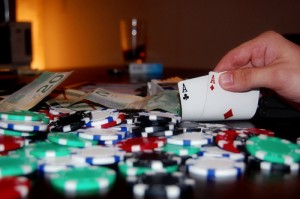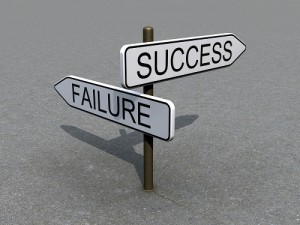Siblings
You’ve just taken a risk. You’ve started reading this text. It might end up badly. Fifty percent of the time, that is to say, according to Caspar Berry, man who after being a professional poker player for three years applies the rules of poker to business. No, this is not right. In fact what he does is try to take poker OUT of business, and set up a science of success – or a science of failure, if you’re a pessimist. But we’re optimists so we’ll call it a science of success.
It is a science because he has proved it through mathematical calculations (that degree of his from Cambridge University came in handy in the end!) In short, He has shown that short term failures do not preclude long term success. In fact, they’re a part of the whole chain (like 2,4,6,8,…but much more complex). Say, if you play a game, you roll a dice and you get a 1-5, you have to pay £60. However, if you rolled a 6, then you would get £400. What would happen if you played this over and over again? Well, if you rolled the dice 6 times, you could expect to get a 1 once, a 2 once, a 3 once, a 4 once, a 5 once and a 6 once. That means you would lose five lots of £60 (that’s £300) but you would get one lot of £400. Hence, overall you’re better off – you are making money. Success! This demonstrates that short term failure is conducive to (or: can lead to) long term success! The thing is that if in the process of playing that game you probably wouldn’t feel successful at all. The times when you lose you would feel really bad, but try to think long term. Without taking the risk and potentially failing five times, you can’t be successful overall. This of course doesn’t guarantee you’ll be a success, but by playing you are more likely to end up better off. The same rule applies to business.
Lets take a look at some examples. Silicon Valley is not just based on success. Under the soil of the visible, media-covered success there lies a thick soil of numerous failures, buried under tons of money. Most of the people who made it to the top were not Bills Gates. The funny thing is that even he could be seen as a failure. In a Harvard graduation speech a few years ago he said that he was probably the most well known failed student in Harvard’s history. He never finished Harvard as Microsoft took too much of his time.
Abraham Lincoln also went through a row of failures before his ultimate success – he was not just an elected president, but:
- Failed in Business in 1831
- Defeated for Legislature in 1832
- Second Business Failure 1833
- Nervous Breakdown in 1836
- Defeated for Speaker in 1838
- Defeated for Congress in 1848
- Defeated for Senate in 1855
- Defeated for Vice President 1856
- Defeated for Senate in 1858
Then finally elected president in 1860. Now this is not the history we often hear, is it? Media focus on successes, on end products, which makes us all believe that success is instant. An express to heaven. We then think that if we fail, we are just not meant for success. Nonsense. Poker face. Just not true. Failure is a sibling to success (not a twin as they don’t come out at once!) but a sibling in a dynamic development of your career path. So don’t let failure discourage you – it’s part of the family! A black sheep of the family, so to speak, but we love it all the same, right?
In our society, thanks to the development of technology, we have so many opportunities. The ways to achieve success through technology are all out there; the only limitation is the power of our imagination – what to do with it all. These opportunities all contain some degree of risk, but how many would you need until you finally succeed?
Now there is one link between the two siblings. The link is called risk. If we carry on taking (commonsense!) risk the probability of success increases with each failure. Counter-intuitive? Maybe. But Caspar Burry is proving that in numbers, so we should trust them. Especially as we have nothing to lose. It’s a risk that can breed a new perspective, a new idea. So take it! And read the text again! And again, until you put it aside and take a real risk. Cause that was just pure profit. 🙂
-
obama health plan abortion
-
samuel ramos




